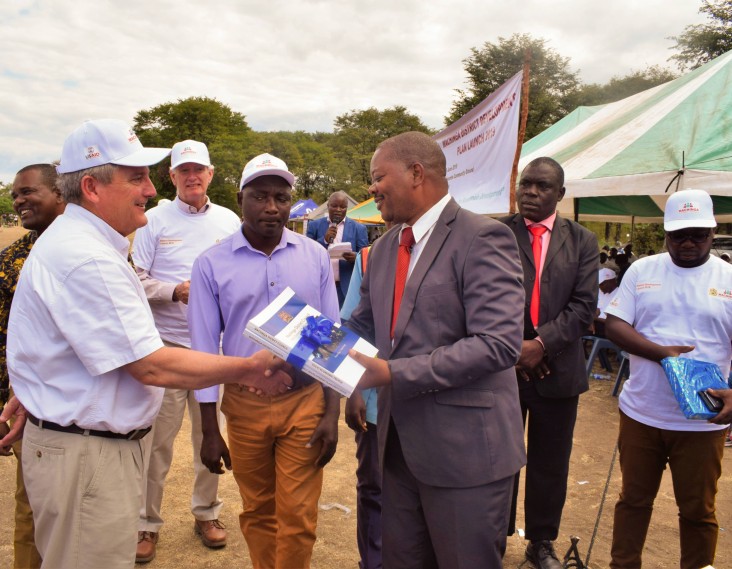Speeches Shim

UNIVERSITIES JOIN FORCES TO REVOLUTIONIZE HIGHER EDUCATION – On August 19, 2019, USAID’s Strengthening Higher Education Access in Malawi Activity (SHEAMA) facilitated the historic signing of a Memorandum of Understanding (MOU) between four Malawian public universities to strengthen collaboration in widening higher education access through Open, Distance, and e-learning (ODeL). The four universities, Lilongwe University of Agriculture and Natural Resources (LUANAR), Malawi University of Science and Technology (MUST), Mzuzu University (MZUNI), and University of Malawi (Chancellor College and the Polytechnic), represented by their respective Vice-Chancellors, committed to undertake collaborative efforts to exponentially increase access to relevant, quality higher education; enhance cost-efficiency in delivering ODeL programs; promote complementarity of programs; and enhance student success. The signing of the MOU signals the universities’ commitment to radically transform higher education in Malawi, making it possible for universities to co-design and offer joint academic programs on shared campuses (ODeL centers), thereby increasing spaces for students to enroll and driving down the cost of attaining university qualifications in Malawi. The MOU further creates the mechanism to co-design courses and programs with industry in order to ensure that university offerings are aligned with the needs of the market. SHEAMA will support the four Malawian public university partners to strengthen and expand their ODeL programs; provide targeted scholarships to 1188 vulnerable students, particularly those those graduating from rural Community Day Secondary Schools; and strengthen the linkages between industry and universities through internships and engagement of industry in course design processes.
GOVERNMENT DECENTRALIZATION PROJECTS EXPANDED TO ALL OF MALAWI'S 28 DISTRICTS – The Local Government Accountability and Performance (LGAP) project is expanding to all 28 districts in Malawi, following an investment of $14.9 million by DFID to strengthen governance systems at the district council level. This additional funding brings the total project value to $39.9 million for LGAP, USAID’s flagship vehicle for decentralization and local government strengthening, which runs from 2016 through 2021. The project expansion from eight to 28 districts is made possible through a collaboration between USAID and DFID. As a systems strengthening project, LGAP supports the Government of Malawi as it devolves personnel, financial, and service delivery responsibilities to increasingly autonomous local government councils. Under the expansion, the project will work with an additional 20 district councils, building on lessons from LGAP’s initial eight districts of M’mbelwa, Kasungu, Lilongwe, Balaka, Machinga, Zomba, Blantyre and Mulanje. Technical and in-kind support to the additional councils will be based on need and evidence-based criteria, while maintaining a focus on institutions and service delivery. LGAP will also provide support to the Ministry of Local Government and Rural Development to strengthen the policy and regulatory framework for decentralization, while concurrently working with the Ministry of Education, Science and Technology to support implementation of education governance interventions in primary schools.
USAID MALAWI WELCOMES CONGRESSIONAL STAFF DELEGATION – USAID welcomed a Congressional Staff Delegation to Malawi from August 19-21, 2019. During the visit, delegation members saw firsthand USG programming across the health, education, and economic growth sectors, visited communities and beneficiaries, and engaged with Government of Malawi (GoM) and USG officials. Highlights of their visit included a full country team briefing on operations in Malawi, a visit to an urban referral hospital, an integrated gender and nutrition activity, a lunch with Malawian university officials to discuss the Strengthening Higher Education Access in Malawi Activity (SHEAMA), and a visit to a community day secondary school to learn how the Secondary Education Expansion for Development project will make a huge impact on secondary school access and health outcomes for adolescents in Malawi. Along the way, staff delegation members also had the opportunity to meet with Peace Corps Volunteers and DREAMS Ambassadors. They ended their visit with a dinner reception attended by Ambassador Scott and the Malawi Minister of Education, where they had the opportunity to review the National Reading Program materials and textbooks, and to learn more about USG-supported education interventions in Malawi.
PERFORM AND FISH ACTIVIES WRAP-UP – Two of USAID’s flagship environmental projects will complete their work at the end of September. The Protecting Ecosystems and Restoring Forests in Malawi (PERFORM) and Fisheries Integration of Societies and Habitats (FISH) helped their GoM partners to make bold strides in forest, watershed, and fisheries management, as well as a variety of complementary activities. A wealth of studies, reports, resources, and media products are now available to support future work in the space on USAID’s ClimateLinks webpage. Congratulations to our PERFORM and FISH colleagues for their superb work with Malawi!

Comment
Make a general inquiry or suggest an improvement.